 |
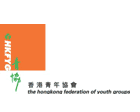
Youth tour wilderness
The
10th Cathay Pacific International Wilderness Experience
Project, organized jointly by Cathay Pacific and the
Federation, was successfully completed at the end of July,
providing an invaluable opportunity for youngsters to be
exposed to the natural, unspoiled environment of the South
African wilderness. Thanks to the continuing sponsorship
of Cathay Pacific 8 delegates from Hong Kong went to join
44 others from Beijing, Shanghai, India, Indonesia, Malaysia,
the Philippines, Vietnam, South Korea, Taiwan, Thailand,
Vietnam, Japan, New Zealand, Bahrain and South Africa.
The 9-day programme at the Entabeni Game Reserve in Limpopo
introduced them to environmental conservation and the protection
of wildlife, but also gave them the opportunity for cultural
exchange with their co-delegates. They learnt how to respect
ecological diversity and came home committed to environmental
protection in Hong Kong.
|
 |
|

Top grades bring rewards
The
Federation has given full support to the “KMB and You,
Heading for a Brighter Future” Award
Scheme, which brought further rewards to ten 10A students
for their outstanding achievements. This is the 3rd consecutive
year in which KMB (Kowloon Motor Bus) has organized this
scheme, giving free travel passes to ten 10A students who
were in receipt of Grade A passes in 10 HKCEE subjects
this year. They are also entitled to a 40-hour leadership
training programme offered by the Federation. The generous
benefits of the travel pass are self-evident while the
valuable opportunity to take part in the training course
can but enhance further their personal development.
|
 |
|
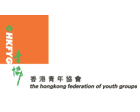
Sports
Challenge to Youth
Basing
their plans on previous successful experience, the Innovation
and Technology Commission, the Education
and Manpower Bureau and the Federation are working together again
on next year's Hong Kong Student Science Project Competition.
The competition provides an excellent testing ground
for our future scientists and 2005 will see the 7th in
the series. Nominations are now welcome from local secondary
schools so if you would like to help young people explore
creative problem solving skills in science and technology
vist http://www.hksspc.gov.hk/hksspc/ for further information.
|
|
|
 |
| 
This century
will be special for China and we are marking it with a series of
events focusing on young Chinese leaders from around the world.
Dragons in China – the First World Chinese Youth Forum will take
place this month in Beijing, bringing together 2000 young delegates.
They will discuss the theme New Opportunities in a Global Economy,
led by renowned guest speakers. The forum will nurture leadership
potential and encourage the growth of networks among young Chinese
that can encompass the globe, enabling mutual exchange and the
sharing of a common
|
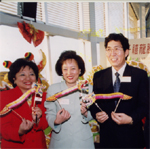 |
|
Dr.
Rosanna
Wong, DBE, JP
|
|
| vision. These
events embrace Hong Kong youth leaders and their Chinese counterparts
everywhere. The series began with Dragon at the Great Wall. Thousands
of young people from overseas, the Mainland, Taiwan, Hong Kong
and Macau took part in a spectacular dragon dance. Next came
The Music of the Dragons – a youth concert which brought together
ten thousand young Chinese percussionists. And now the long-awaited
First World Chinese Youth Forum. This meeting will generate synergy
and emphasize Chinese commitment to global development. Want
to know more? Visit www.hkfyg.org.hk/dragons
in china/

|
|

Belle and Chun-kong on China
Exchange trips to China
have taken place for decades but since ’97 they have grown in
number and significance. Belle and Chun-kong
went on an early Federation study tour to earthquake-devastated
Tangshan. Like many other young Chinese people who have come to
know China through exchange trips, they were surprised how much
at home they felt. Belle went again in 2000 to take part in the
Dragon Dance at the Great Wall – the first event held to celebrate
the Century of the Dragon. Belle and her cohort talked about their
experience of study tours to China and agree how forcibly they
can bring out the Chinese sense of identity while also bringing
home the idea that despite cultural and linguistic differences
we all have a great deal in common. Belle: Do you remember
Tangshan? An earthquake hit the city in 1976 and nearly a quarter
of a million people died. Half as many
again were injured when 93% of all the homes in the region were
reduced to rubble. Fortunately 80% of those buried survived but
the memories linger. That’s where we went on the study tour.
HKFYG: Did you meet many local people?
Belle: Yes, we did community service at a primary school and a
home for the elderly. One day we visited Jin, a Tangshan student,
and talked to his mother who remembered the earthquake well. We
also visited the hospital and the memorial to the dead which carried
an engraved plaque with hundreds of names. The impact of the disaster
was still so palpable, it was impossible not to imagine the crying
faces amid the rubble.
HKFYG: What are your lasting impressions of that first trip?
Chun-kong: The most impressive fact was the ability of the people
to turn this terrible experience into a driving force. With their
combined effort Tangshan has been rebuilt as a prosperous city.
HKFYG: Then you went
again in 2000 didn’t you Belle?
Belle: Yes I was one of the Hong Kong delegates on the Beijing
Youth Conference.
HKFYG: How did it go?
Belle: First we did
the Dragon Dance. It was fantastic, so cold but there was blue
sky and brilliant sunshine. It was my first
time there and we were all dressed in warm yellow jackets and red
shoes. Imagine, over three thousand of us doing a dragon dance
on the Great Wall. The dragon was ten thousand feet long and we
even had Jackie Chan with us, at the dragon’s head. I’ll never
forget the sense of co-operation and teamwork, together with young
Chinese people from all over the world, all dancing together.
HKFYG: What do you think is the best thing about exchange trips
Chun-kong?
Chun-kong: In the past
I had misunderstandings about people from the Mainland. I thought
they were very backward. This tour made
me see how biased I had been. The people of Tangshan were not only
friendly but skilful – they were equipping themselves for the
future of their country. In fact I think they have a much more
positive
attitude towards life than the people of Hong Kong.
Postscript: Delegates who have participated in other HKFYG Dragon
exchange programmes since 2000 agree with Belle and Chun-kong:
Sometimes I suffer from
identity crises but during this period, by sharing these thoughts
with others…I have become more confident
to be a descendent of the Dragon.
Zhu Ting, UK
We saw such disparity of living standards between the coastal and
rural areas of China. One of the delegates could not help but cry
to express her deepest sympathy about the situation, despite the
fact that she is from the US – the bonds of brotherly blood are
so thick. Antony Yiu Tsz-chung, USA
|

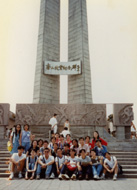
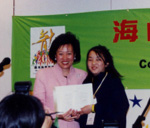
|
 |
 |
|
|
Term time problems
The months at the beginning
of the 2003-04 school year brought the Federation’s Youthline
2777-8899 seven times more calls from
students than they received at any other time of year. Naturally,
the callers wanted to talk about the problem of adapting to life
back at school after the summer holidays. During the year as a
whole the Federation handled a total of 52,625 calls seeking help.
Among the calls, 18% overall (9,485) related to problems faced
at school, 9% (4,737) to emotional problems and 6.6% (3,447) to
family problems. Youthline received most of its calls, a total
of 20,263 (38.5%), from youngsters aged between 6 and 17, the majority
(38.1%) of whom were concerned about inter-personal relations and
academic pressure (21.8%). To ease their worries, Federation counselors
encourage youngsters to develop a caring attitude, use effective
time management strategies, face their studies with optimism and
learn from failure.
|
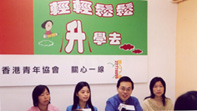
|
| |
|
|
Training programmes
welcome
The Youth Pre-employment
Training Programme (YPTP) and the Youth Work Experience and Training
Scheme (YWETS) received encouraging
feedback from the young people who took part this year and comment
from the community was also very favourable. More than 21,000 applications
for YPTP and YWETS were received by the Labour Department, providing
F.5 school leavers with useful vocational training which will certainly
improve their employability. Such a positive response shows the
community’s concern for the problem but also their recognition
of the good such programmes do.
|
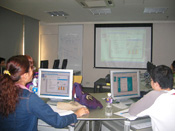
|
| |
|
|
|
|
| |
|
|

